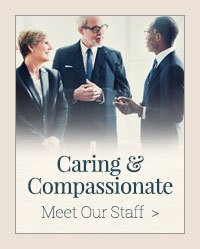GRIEF GOES TO WORK
Grief is a normal and natural reaction to loss that cannot be turned on and off. While the workplace may not seem to be an appropriate place to grieve, grief knows no boundaries. It can strike anywhere, anytime, anyone. It is a complex process that is emotional, physical, psychological, social and spiritual. It impacts you at every level of your being. Grief is an individual and a community response that varies according to the person and the circumstances, it has no time table and lasts far longer than anyone expects. Grief is not a lack of faith or a sign of weakness. People grieve because they love.
Research shows grief impacts the workplace in a variety of different ways:
- Poor concentration and difficulty making decisions.
- Loss of productivity.
- Frustration and irritability.
- Increase in accidents.
- Disinterest in job-related details.
- Increase in absenteeism and/or tardiness.
- Mood swings and detachment.
- Marital and family problems.
Friends and co-workers don’t know how to react and may not know what to say. Supervisors don’t know what to expect in terms of job performance. A bereaved employee may become frustrated at the prospect of performing tasks that may seem trivial by comparison with the loss.
On the job support enables bereaved employees to heal and once again become productive and invested in the work environment.
For the Grieving Employee
Seek information that will help you understand all of the reactions to grief. Although you may have had time off immediately following the death, you will find that your grief follows you to work long after the funeral is over. You may feel numb and like you are moving in slow motion. You may be surprised by strong feelings of emotion that can be overwhelming. You may find yourself unable to concentrate or even become physically ill. It is normal to experience headaches, anxiety, shortness of breath, irritability, sudden bouts of crying or restlessness. Grief sometimes comes in waves and can seem paralyzing, handling these reactions at work may be difficult and embarrassing because there are few places or opportunities to express your grief.
Anger and guilt are common emotions. You may feel angry with God, your spouse, your family, yourself or others. You may feel angry at your employer because you have to return to work as if nothing has happened, but the reality is that someone you love has died and your world has changed forever. It may feel as if no one understands. Feelings of loneliness and depression can further isolate you and create awkward moments with co-workers and employers; no one knows what to say or how to act. Try to be patient with them and most of all, be patient with yourself. Let people know what you need. They really want to help, they just don’t know what to say or do.
- Take care of yourself physically.
- Be realistic in your expectations of yourself and others.
- Don’t try to lessen the pain with drugs or alcohol. They only provide temporary relief and can intensify the grief later.
- Find ways to release emotions in safe, non-destructive ways. Scream in the shower, pound your pillow, hit tennis balls, put some motion to the emotions…exercise.
- Focus on one worry at a time.
- Share your thoughts and feelings. Seek out friends or family who will listen.
- Try keeping a journal or writing letters to your loved one. Find a way to express your feelings.
- You may find comfort in a support group.
- Hold on to the memories by creating photo albums or scrapbooks.
Remember—how you live your life from this day forward can be a great living tribute to the love you shared and to your loved one’s life.
What Can Employers Do?
- Acknowledge loss with sensitivity and compassion.
- Attend the funeral services, if possible; send flowers or a bereavement basket.
- Be supportive. It is important to know the details of the death and how much the family wants other employees to know. Share this information to stop rumors.
- Be prepared by knowing company policies and procedures. Flexible personnel policies may be necessary to accommodate the needs to the bereaved.
- Respond appropriately by adjusting work schedules as needed.
- Know about available support systems and make appropriate referrals. Check with your Employee Assistance Program.
- Provide ongoing support. Create a Resource Center with brochures, books, videos, etc.
Your actions and reactions at a time of crisis can create loyal employees. An employee will give you 110% if they feel you care about them and their families, they will be invested in you if they perceive you are invested in them.
What Can Co-Workers Do?
Acknowledge the loss. Send flowers or a card and attend the funeral services if possible. Offer assistance, think of things that would be helpful for you, such as taking over extra paper products, or coffee and sodas. You can offer to cut their grass, give phone cards so long distance calls can be made to family members. In addition to these ideas, here are a few more suggestions:
- Offer to just listen. Grieving people need to talk about what has happened as they try to make sense of what the future holds for them.
- Let them know you care but avoid clichés such as, “It is God’s will” or “At lease he didn’t suffer.” While your intent is pure, these words are not comforting. The best thing to say is “I don’t know what to say. I wish I could make things better but I can’t. Please know I am here for you.”
- Leave invitations to talk.
- Don’t try to find something positive in the loss; loss hurts.
- Listen and then listen again. You can’t hear if you are doing all the talking. Your friend needs to be heard.
- Remember important days such as the anniversary date of the death, holidays or a birthday. You might consider getting a group of co-workers together to help with holiday decorations.
- Don’t be embarrassed if tears come, everyone cries. Some cry outside and some cry inside. Don’t make the grieving person feel like they have to apologize for loving someone and don’t apologize for your tears either. You are both human and tears are the windshield wiper fluid of the soul.
- Continue to be there. Grief resurfaces at unexpected times.
A grieving person feels as though the world has been lost. Losing a loved one is enough. Losing friends and support compounds the feelings of isolation, doom and, “what’s the use?” An appropriate response to grief strengthens the relationship between employers, employees and co-workers. Remember, your presence sends a message of compassion and caring that is immeasurable.



